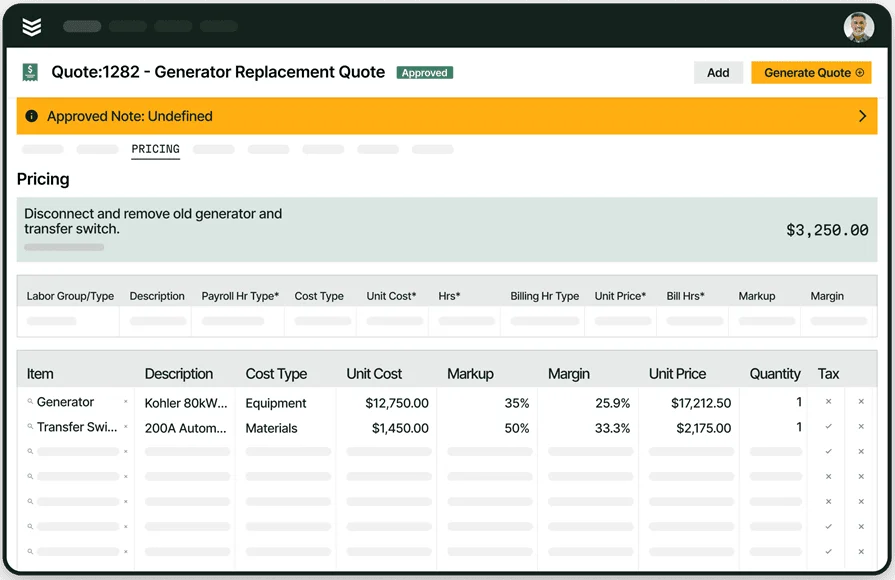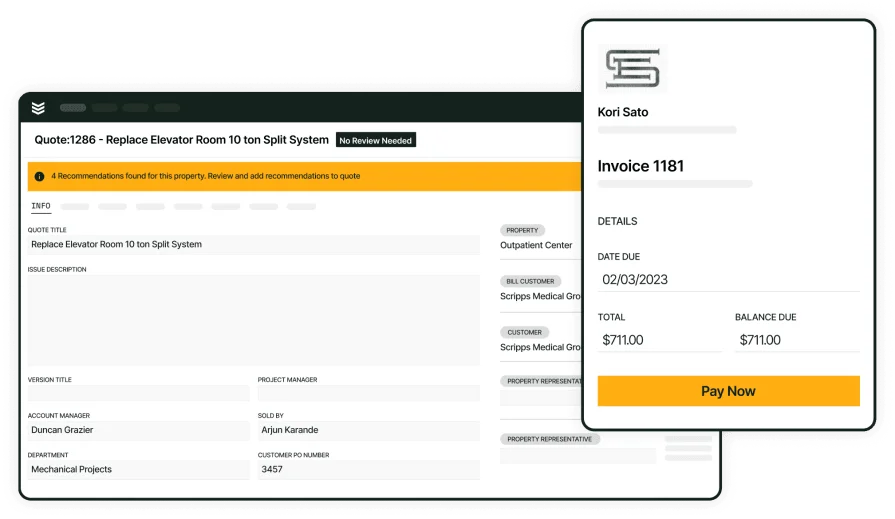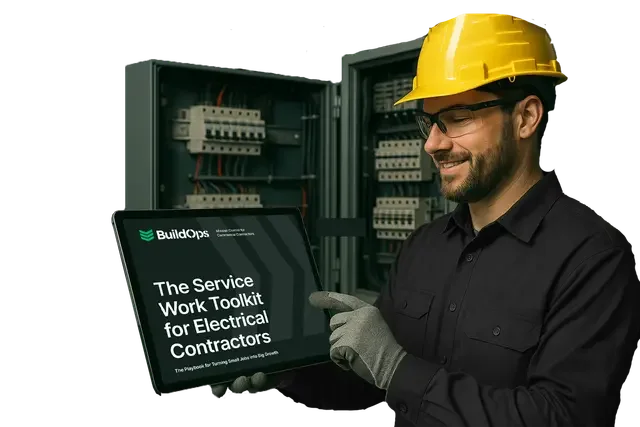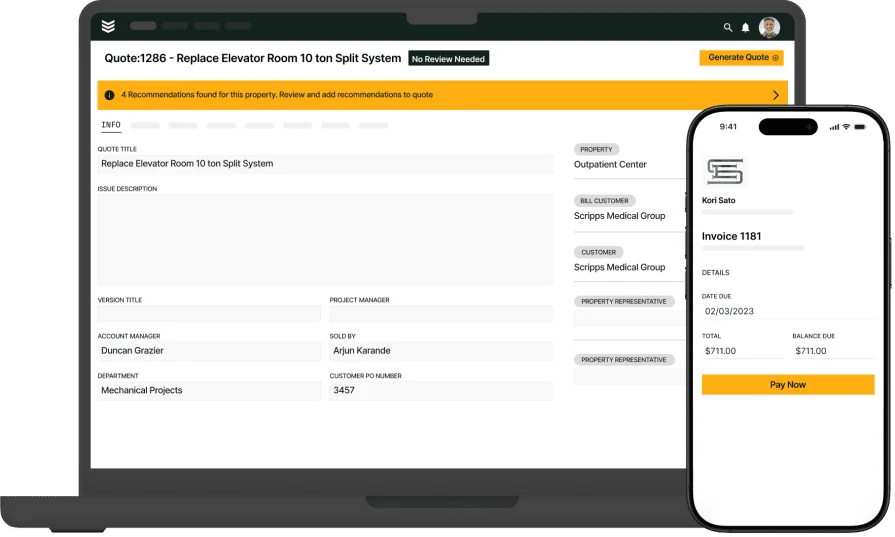If you're an electrical contractor, you know the pressure. One mistake in your estimate can cost you the job—or even worse, the job turns into a money pit. Bidding with a guess and juggling spreadsheets leaves too much room for costly slip-ups. That’s where electrical estimating software steps in. It helps you nail down labor, materials, permits, and profit margins with accuracy. You get bids out faster, land jobs with confidence, and protect your bottom line.
For those in the electrical industry, estimating software simplifies the heavy lifting. Whether you’re quoting residential service calls or large commercial projects, having the best electrical estimating software gives your business an edge by reducing errors and speeding up the entire estimating process. Here’s what we’ll cover to help you find the best solution:
- Choosing the right estimating software for electrical contractors
- 6 key features to look for in electrical contractor estimating software
- 7 best electrical estimating software options for every contractor
- 7 benefits of using electrical cost estimating software
- 5 important electrical estimating software FAQs answered
The optimal choice of electrical contractor estimating software varies. Your specific needs are shaped by the scale of your operation, the nature of your electrical work, and the level of detail demanded in your quotes. Therefore, understanding key considerations before selecting electrical contractor estimating software is crucial.
Choosing the right estimating software for electrical contractors
For electrical contractors, estimating is where every profitable job begins. Field techs and estimators handle wire counts, breaker panels, conduit lengths, labor, and permits while racing to keep bids competitive. One error can burn profits or throw off schedules. This makes electrical estimating software essential. The tool directly supports your team both in the office and out in the field. Your electricians need a system that allows fast, accurate estimates whether they’re on a site walk or back at the shop.
Before picking a platform, review these key factors to find the best electrical estimating software for your operation:
- Ease of use - Can your team create estimates without long hours of training? Does the software offer an interface that field techs can easily navigate while on-site? Are templates and drag-and-drop functions available to simplify complex calculations?
- Custom pricing and labor rates - Can labor rates be adjusted based on project type, crew experience, or location? Does the platform let you update supplier pricing in real time to reflect market changes? Are material databases customizable to match the parts your electricians actually use?
- Integration with other tools - Will estimates flow directly into your accounting, scheduling, and invoicing platforms? Can job details transfer automatically to work orders and field service apps? Does the integration eliminate double entry and keep your data consistent?
- Cloud-based and mobile access - Can electricians generate and edit estimates while on-site with a tablet or phone? Are updates made in real time for your office staff to review immediately? Can multiple team members collaborate on estimates without being tied to one location?
- Features - Does the electrical contractor estimating software include pre-built templates for common installs and repairs? Are automated calculations available to handle complex takeoffs and material lists? Do reporting tools provide visibility into job costs, margins, and bid accuracy?
Choosing an electrical contractor estimating software comes down to efficiency, precision, and adaptability. Now let’s break down the specific features that separate the strongest tools available.
6 key features to look for in electrical contractor estimating software
Getting an estimate right shapes everything that happens on the job. For electrical field service contractors, bidding too high pushes clients away. Bidding too low eats up profit fast. Every wire, breaker, panel, and labor hour must be factored in correctly, and done quickly, often while technicians are still on-site.
That’s where electrical estimating software plays a huge role. The strongest platforms help electricians handle job complexity, eliminate manual errors, and build professional estimates that win bids and protect profit.
Here are the six key features that help electrical contractors stay sharp in the field and in the office:
1. Scheduling and dispatch integration
When your estimating tool connects with both scheduling tools and dispatch management systems, your entire job cycle stays connected. Estimates flow directly into booked jobs, and crews get assigned fast without extra data entry.
Let’s say a service manager quotes a breaker panel upgrade during a walkthrough. As soon as the client approves the estimate, the platform automatically schedules the work crew, assigns the technician, and dispatches them to the right site. This cuts delays, keeps electricians moving, and ensures the estimate becomes billable work without bottlenecks.
2. CRM and customer management
A strong electrical contractor estimating software links directly with customer management systems to store client data, track previous estimates, and pull up service history instantly. This helps estimators build accurate quotes based on real customer information.
For example, during a routine service call, a technician finds outdated wiring that may violate code. By pulling up the customer’s full job history and prior estimates, the estimator can immediately generate a quote for the necessary upgrade while referencing past pricing and labor details—all while standing in the customer’s electrical room.
3. Fleet and vehicle tracking
For field service operations, having fleet tracking tightly connected to your estimating process ensures that the right crew arrives with the right tools, every time. This directly supports accurate quoting and scheduling.
Consider a job where a tech needs to install new underground conduit at a commercial property. Before quoting, the estimator checks real-time vehicle locations and availability of trenching equipment. The system ensures the right crew, gear, and vehicle are ready to execute the estimate’s scope of work without costly reschedules.
4. Invoicing and payment processing
The best electrical estimating software should flow seamlessly from estimate to invoice. When tied into invoicing and payment processing, it guarantees that every material, labor hour, and markup moves into billing without re-entry.
Say your crew finishes a parking lot lighting retrofit. With estimate data already loaded, the office generates the invoice on completion. Clients can pay immediately, and you skip the long paper trail that drains cash flow. Every labor hour and part from the estimate transfers directly into the invoice automatically.
5. Technician mobile access
In the field, your team needs mobile access. With technician mobile apps, electricians can build estimates while inspecting job sites, verify part availability, and adjust pricing instantly based on site conditions.
Take a scenario where a tech finds that existing conduit is damaged during a retrofit estimate. Instead of calling back to the office, they adjust the material list, labor time, and costs directly from their tablet on-site. The client reviews the updated estimate before the tech even leaves the property.
6. Reporting and job performance tracking
Effective electrical cost estimating software includes strong reporting tools that track estimate accuracy, profit margins, and win rates over time. This helps contractors refine pricing models and identify where bids succeed or fail.
For instance, after reviewing monthly reports, an electrical service manager notices that panel upgrade bids have slimmer profit margins than expected. With this insight, they adjust labor assumptions and material pricing in the estimate templates to protect profits on future jobs.

Quote jobs precisely
Streamline estimating to quote jobs more accurately.
Other valuable features for electrical contractors
Beyond the core features, some electrical estimating software platforms include extra tools that improve how electrical service businesses operate day-to-day. These additions might not be critical for building estimates, but they help run a tighter shop, keep teams productive, and strengthen customer relationships.
- Service agreement management - With service agreement tools, contractors can automate recurring maintenance contracts. This helps electrical service companies stay organized when managing long-term clients, scheduled inspections, or preventive maintenance work. Contracts are tracked in one place, making renewals and invoicing seamless.
- Sales pipeline management - Sales tracking built into pipeline management tools allows contractors to monitor active bids, see which estimates are converting, and follow up on outstanding proposals. This visibility helps prioritize which jobs need attention and keeps the estimating pipeline full.
- Technician time tracking - Accurate labor forecasting starts with real data. With time tracking software, contractors capture real labor hours directly from the field. This data feeds back into future estimates, improving labor projections and helping fine-tune pricing models for new bids.
With these core and additional features in mind, choosing the right electrical estimating software becomes much clearer. But with plenty of platforms on the market, it helps to break down which ones serve electrical contractors best based on job type, business size, and field service demands. Let’s take a closer look at the best electrical estimating software options available today.
7 best electrical estimating software options for every contractor
For electrical contractors to get real value from electrical estimating software, the solution must match the way they work. Field service jobs shift daily. Technicians balance service calls, installs, repairs, and emergency fixes—all while racing to deliver accurate bids. Choosing the right tool means finding software that delivers essential features while fitting into your team’s real-world workflow.
Below are the best options available for electrical contractors today.
1. Best for commercial contractors: BuildOps
BuildOps is designed for commercial electrical contractors, offering a full suite of tools to simplify complex estimating on large-scale projects. It covers everything from material takeoffs and labor calculations to final proposals, keeping estimates accurate and competitive. Every estimate flows into scheduling, dispatch, invoicing, and job management for a full field service operation.
How pricing works: BuildOps uses a customized pricing model based on your business size, job volume, and operational needs, so you only pay for features that impact your estimating process directly.
Features beyond estimating:
- Real-time cost tracking and job costing
- Automated labor and material calculations
- Seamless integration with scheduling and invoicing
What sets it apart for commercial: BuildOps tailors electrical contractor estimating software specifically for complex commercial jobs. Its automation of takeoffs, real-time pricing, and end-to-end integrations keep large field service operations running smooth from estimating through job completion.

Explore BuildOps estimating
Complete control over estimating, quoting, and project management.
2. Best for residential contractors: Housecall Pro
Image Source: Housecall Pro
Housecall Pro offers residential electrical contractors a simple interface for estimates, job scheduling, and client management. Smaller service teams can quickly generate quotes, schedule jobs, and manage invoices on one platform without heavy training requirements. However, Housecall Pro may lack the advanced job costing and customization larger commercial firms require.
How pricing works: Housecall Pro provides tiered pricing plans, allowing companies to select packages based on team size and service needs.
Features beyond estimating:
- Built-in scheduling and dispatching tools
- CRM features for customer management
- Mobile app for on-the-go estimate creation
What sets it apart for residential: Housecall Pro simplifies estimating for residential service calls, giving small teams fast quoting, customer management, and scheduling on mobile devices.
3. Best for general contractors: Jobber
Image Source: Jobber
Jobber works well for electrical contractors who handle various service jobs alongside general contracting work. Its easy interface supports quick quoting, job tracking, and mobile estimate creation. But for contractors managing larger projects or seeking detailed estimating functions, Jobber may fall short in advanced reporting and complex estimating needs.
How pricing works: Jobber offers three subscription levels, so contractors can choose features that match their business operations.
Features beyond estimating:
- Real-time job tracking and management
- Drag-and-drop scheduling interface
- Mobile app for field access
What sets it apart for general contractors: Jobber balances quoting, scheduling, and task management, making it useful for smaller shops that handle a wide variety of work types.
4. Best for large-scale projects: SimPRO
Image Source: Simpro
SimPRO delivers advanced project estimating for high-volume commercial electrical contractors. It handles job costing, automated takeoffs, material tracking, and deep financial reporting. Because of its robust complexity, smaller service contractors may find SimPRO too detailed for their day-to-day estimating needs.
How pricing works: SimPRO operates on a subscription model, scaling pricing according to business size, team users, and feature levels.
Features beyond estimating:
- Inventory management and real-time materials tracking
- Automated takeoff tools for accurate bids
- Full integration with accounting and job management
What sets it apart for large-scale projects: SimPRO serves contractors managing multi-phase jobs where advanced cost tracking and detailed estimating are required to maintain profitability.
5. Best for quick electrical estimates: Clear Estimates
Image Source: Clear Estimates
Clear Estimates is built for electrical contractors that prioritize speed and simplicity. Pre-built templates and customizable material pricing let contractors turn around estimates fast. However, it may fall short for companies needing advanced integrations with field service or dispatching platforms.
How pricing works: Clear Estimates follows a simple monthly subscription that’s budget-friendly for smaller electrical service businesses.
Features beyond estimating:
- Customizable pricing databases
- Pre-loaded templates for common electrical jobs
- Basic customer management tools
What sets it apart for fast estimates: Clear Estimates allows techs and office staff to generate quick, professional estimates with minimal setup.
6. Best for electrical construction: Vision InfoSoft
Image Source: VisionInfosoft
Vision InfoSoft provides a specialized platform designed specifically for electrical construction estimating. Its tools include detailed takeoff features, extensive material pricing databases, and flexible bid management tailored to complex electrical projects. For smaller service contractors focused on residential or maintenance work, Vision InfoSoft may offer features beyond what their daily operations require.
How pricing works: Vision InfoSoft follows a customized pricing model based on contractor needs, offering various packages for different business sizes and estimating complexity.
Features beyond estimating:
- Integrated electrical database with thousands of preloaded items
- Automated takeoff and labor calculations for large-scale projects
- Flexible reporting tools to analyze bids and job costs
What sets it apart for construction: Vision InfoSoft simplifies estimating for electrical construction contractors handling large commercial installations, new builds, and complex bidding environments where material and labor precision matter most.
7. Best for sales-driven electrical teams: Estimate Rocket
Image Source: Estimate Rocket
Estimate Rocket helps residential and light commercial electrical contractors focus on speed, proposals, and customer follow-up. It automates proposal creation and bid tracking, keeping sales pipelines moving. But for contractors managing complex field operations, Estimate Rocket may lack deeper integrations for scheduling, dispatch, and advanced job costing.
How pricing works: Estimate Rocket offers monthly subscription pricing based on team size and user needs.
Features beyond estimating:
- Digital proposal creation and signature tools
- Follow-up automation to close bids faster
- Basic invoicing and small-team job tracking
What sets it apart for sales-driven teams: Estimate Rocket simplifies proposal management, helping small electrical teams close jobs faster while keeping customer communication clear.
7 benefits of using electrical cost estimating software
The right electrical estimating software doesn’t just improve bids—it reshapes how electrical contractors run field service work. From landing profitable jobs to keeping every detail organized across teams, accurate estimating drives efficiency across the entire business.
1. Faster bids help win jobs quickly
Speed gives contractors an edge. With automated labor, material pricing, and templates, estimates get built while walking job sites or right after inspections. Clients receive professional bids fast, often before competitors submit theirs.
2. Fewer invoicing errors and faster payments
When estimates automatically feed into billing, invoices reflect real labor, materials, and markups without extra data entry. This leads to fewer errors, cleaner customer invoices, and faster cash flow. Field service businesses that rely on tight invoicing systems can benefit by following these electrical contractor invoicing guide best practices that support a smooth transition from estimate to payment.
3. Smoother scheduling from approved estimates
Once a customer approves a quote, job details transfer directly into schedules and dispatch boards. There’s no need for duplicate data entry or manual work orders. These integrated electrical dispatch software solutions keep field crews moving while staying aligned with what was promised during estimating.
4. Stronger customer relationships through better data
Storing estimate history, service records, and proposal details in one system allows teams to access customer information quickly. This strengthens communication and trust with repeat clients. Contractors following the best CRM for electrical contractors principles can deliver consistent service backed by accurate job and estimate records.
5. Improved forecasting for future projects
Every estimate builds a stronger database. Over time, contractors gain insight into actual labor hours, materials usage, and profit margins. These insights refine future estimates and protect profit margins on similar jobs ahead.
6. Consistent estimates across the entire team
Whether a senior estimator or a new technician creates the bid, templates and automated calculations ensure every estimate follows consistent standards. Clients receive professional, predictable quotes that reflect your company’s pricing model every time.
7. Simplified bidding from the field
With mobile estimating tools, technicians can build accurate quotes while on-site. This prevents delays and gives customers immediate pricing while work is fresh. Platforms that support electrical bidding functionality allow field techs to handle estimating directly from their mobile devices.

Estimate jobs with precision
Access best practice, real-life examples, and templates to learn from
5 important electrical estimating software FAQs answered
Still sorting through how electrical estimating software works for your business? Whether you're new to digital estimating or looking to update your process, many electrical contractors and field techs have similar questions. Below are clear answers that explain how this software helps manage estimating for service calls, installs, and complex jobs alike.
1. What is electrical estimating software?
Electrical estimating software helps contractors build accurate estimates for service jobs, and small to large-scale projects. It handles material and labor calculations, applies markups, and creates professional proposals. Many platforms also connect directly with the rest of the field service operations.
2. How does electrical estimating software work?
The system uses built-in templates, price databases, and automated calculations to handle every estimate detail. Contractors input materials, labor hours, equipment specs, and permit fees, while the software generates a complete bid. Many best electrical estimating software platforms also include live supplier pricing updates, so quotes reflect current costs.
3. Who should use electrical estimating software?
Any electrical contractor—whether handling residential service calls, commercial installations, or multi-phase projects—can benefit from digital estimating. For those still building estimates manually or struggling with pricing consistency, electrical contractor estimating software creates faster, more accurate bids and eliminates hours of back-and-forth calculations.
Did you know
Our customer Jolma Electric is a great example of who should use estimating software, and why it’s worth the price. They saw a 50% spike in efficiency after using BuildOps, and you could too.
4. Can electrical estimating software integrate with other business tools?
Yes. Many platforms integrate directly with scheduling, dispatch, invoicing, and CRM systems. This allows electrical cost estimating software users to carry estimate data straight into work orders and invoices, cutting out duplicate entry and reducing the chance for errors during handoffs between office and field teams.
5. What are the best practices when using electrical estimating software?
Following strong best practices helps electrical contractors get the full value from electrical estimating software. These habits improve estimate accuracy, protect profit margins, and keep both field techs and office teams aligned across every stage of a project.
- Use pre-built templates for repeatable jobs
- Regularly update material and labor pricing
- Break down every estimate by labor, materials, and overhead
- Train both office staff and field techs on the platform
- Use real-time cost tracking to adjust on active projects
- Set consistent markup rules for every estimate
- Review completed job data regularly
- Integrate estimating with scheduling, dispatch, and invoicing
- Maintain separate templates for commercial and residential work
- Use mobile estimating tools for onsite adjustments
At the end of the day, solid estimates are the foundation for every profitable electrical job. From simple service calls to complex commercial builds, having reliable electrical estimating software gives contractors the control and confidence to bid with accuracy and protect margins. Whether it's speeding up field estimates, improving job costing, or syncing with dispatch and invoicing, the right platform helps keep crews efficient and customers satisfied.
For commercial contractors managing larger teams and multiple projects, BuildOps stands out as a full-service solution. Its estimating tools integrate directly into the broader field service operation—linking scheduling, dispatch, quoting, invoicing, and real-time job management into one connected system built for commercial field work.

Give BuildOps a Try
See how we help teams combine estimating and field service to get more jobs done.







